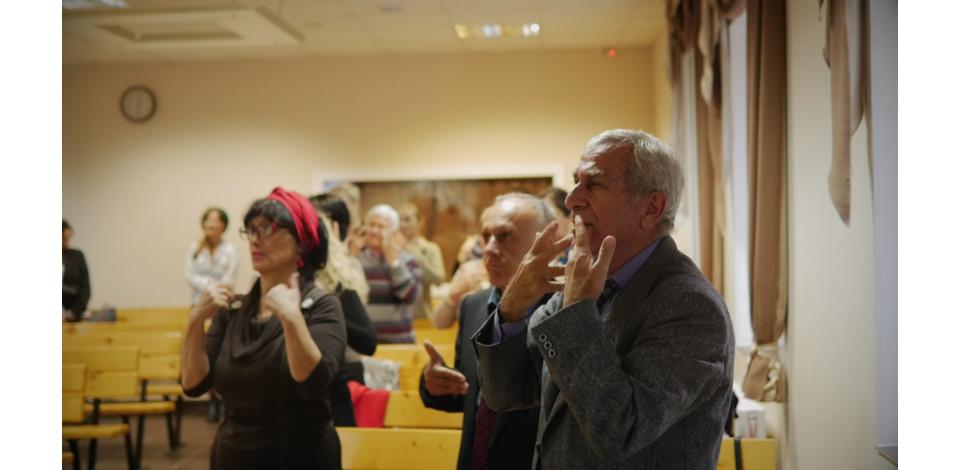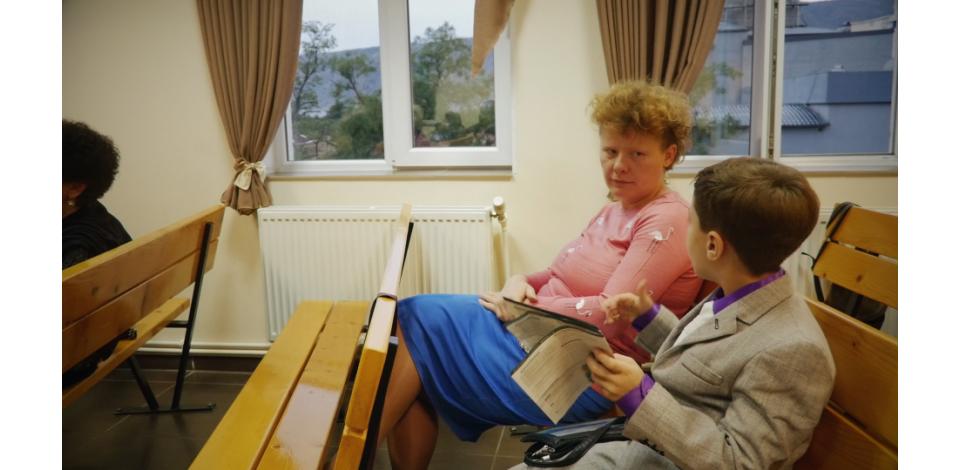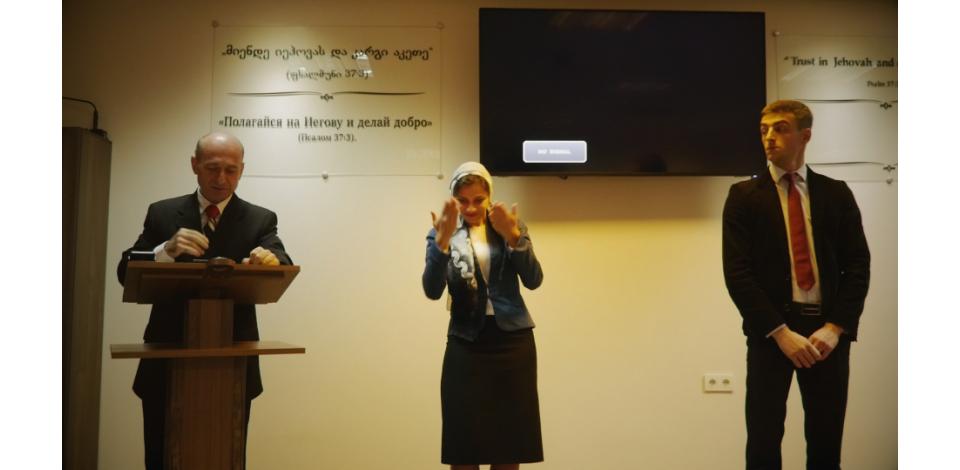Jehovah’s Witnesses: Watchtower of Rights
Author: Giorgi Meladze
Brief history of the religious union’s formation
Jehovah’s Witnesses is a Christian society, which has more than 8 million members in approximately 240 countries of the world, as of 2016. From that, up to 18 thousand members are in Georgia. The headquarters of the organization are located in the United States; however, the members of the organization refer to it not as an American organization, but rather as an international religious group. The name – “Jehovah’s Witnesses” – is biblical. “Jehovah” is the name of God. Jehovah’s Witness means “the messenger of truth about God”.
History of the modern-day organization of Jehovah’s Witnesses begins at the end of 19th century. In Pennsylvania, a small group of Bible students started a study on Bible. The study aimed to re-think the dogmas set by the church and compare them to the Biblical text. Charles Russell, whose works unified the like-minded people for the first time, was a member of the given group, too. There is a Russian doctrine movement, too, founded by Captain Nikolai Ilyin. As of today, the American movement is the most widespread around the world.
Jehovah’s Witnesses proclaim Bible as the sole foundation of their belief and religious life. The aspect, distinguishing Jehovah’s Witnesses from other Christian groups, is the denial of the Holy Trinity. They recognize the Son and the Holy Spirit, however, deny their consubstantiality with the Father. According to Jehovah’s Witnesses, the soul of the person is the person himself/herself, therefore, they do not recognize the immortality of soul. They explain that during the universal resurrection, only the true will enter the heaven.
Jehovah’s Witnesses are pacifists and they do not participate in wars, political battles and conflicts.
In Georgia, the teachings of Jehovah’s Witnesses have been disseminated since 1920s, by an organization, created in Lebanon. Later, those who acquired knowledge during deportations and military imprisonments became the first members of the group. Their number increased slowly, as Soviet repressions did not allow the opportunity to preach openly. As of 1990, the number of believers reached 900.
While speaking about Georgia in 1990s, it is impossible to avoid the organization of Jehovah’s Witnesses. This group became the main target of repression for the public and the state. Up to 800 cases of assaults on religious minorities were recorded in 1997 – 2002. This included raiding gatherings, destroying literature, beating, torturing and publicly humiliating. Jehovah’s Witnesses were the main target of this aggression.
Persecution of Jehovah’s Witnesses in 1990 – 2000s
Jehovah’s Witnesses turned out to be the only religious union in Georgia, the registration of which was cancelled by the state. Union of Jehovah’s Witnesses was registered on April 17, 1998. Second legal entity, called The Branch of the Watch Tower Bible and Tract Society of Pennsylvania in Georgia, was registered on June 11, 1998. By that time, eleven legal entities, founded by various religious organizations, had already existed in Georgia. Nevertheless, only Jehovah’s Witnesses became the target for radical politicians. For instance, a politician and a public figure, Guram Sharadze, began to fight against the members of the group through public gatherings, calls for violence and court disputes. In 1998, he filed a lawsuit to the court, asking for the cancellation of organization’s registration. In 2001, the Supreme Court of Georgia cancelled the organization’s registration conclusively. According to evaluations of international organizations, this decision played a major role in significantly restricting the rights of the group members. The organization managed to restore registration only in 2003, whereas in 2014 it became a legal entity under public law.
One of the manifestations of the radicalization of the political background was the creation a group of followers of Basil Mkalavlishvili, a priest, who became famous through persecuting religious minorities and raiding the gatherings of Jehovah’s Witnesses. The radicals had the freedom to act, assigned to them by the state. The government was turning a blind eye to the acts of raiding and was not carrying out investigation. Against the background of inactivity of the state, numerous brutal offenses were made, based on which, the members of the organization filed a lawsuit to the European Court of Human Rights (ECHR).
Jehovah’s Witnesses’ Battle for their Rights
Four decisions were adopted by the ECHR in relation to the cases of Jehovah’s Witnesses; their short summary is as follows:
“Members of Gldani Congregation of Jehovah’s Witnesses and others against Georgia”: On June 29, 2001, Jehovah’s Witnesses filed a lawsuit to the ECHR. On May 3, 2007, the court ruled that the state had flagrantly violated the rights of the plaintiffs. On October 17, 1999, approximately 120 members of the organization were holding a religious meeting in Gldani region, when they were attacked by a mob, headed by the excommunicated Orthodox priest – Basil Mkalavlishvili. The act of attack was recorded by TV channels and there were numerous footages, showing the perpetrators. Nevertheless, Georgian law enforcement bodies did not react on this matter. As the representative of the plaintiff noted, the inactivity of the law enforcement bodies encouraged extremism and provoked other attacks. ECHR noted that:
“111…. The case contains enough evidence to confirm that policemen, notified by the plaintiffs in various ways and quite swiftly (§14 in fine and §28), refused to get involved with the aim of preventing violence and protecting victims. The government does not have suitable arguments in this regard…
… 119. Considering the aforementioned circumstances, the court rules that competent bodies, in light of owning important and sufficient evidences to carry out their legal duties, demonstrated a clear negligence in the case of identifying the alleged perpetrators.”
As mentioned above, the court ruled that Georgia violated religious freedom towards 96 plaintiffs. A collective lawsuit - “Begheluri and Others v. Georgia” - was filed to the ECHR in 2002, while the final decision was made by the court on October 7, 2014. The lawsuit described several facts of attack and the special emphasis is made on raiding the meeting on September 8, 2000, attended by up to 700 members.
A total of four cases of religiously motivated violence are included in the lawsuit; police officers, as well as other representatives of governmental bodies were participants in the given cases. In addition, there are four other cases, in which their indirect participation has been revealed. A total of 30 cases of violence are described and despite the plaintiffs addressing investigatory bodies, the courts refused to review the lawsuits. The Office of Prosecutor General did not adequately react to the lawsuits either. In three cases, the plaintiffs filed lawsuits directly to the Supreme Court of Georgia, however, the court did not accept their request. ECHR points out in its decision: “137. In the given situation, ECHR is especially stunned by the fact that respective local bodies and representatives of the government, in their statements sent to the court, continued to claim that several investigations could not have been carried out due to impossibility of identifying the perpetrators – despite the fact that several of them were very clearly outlined in the plaintiffs’ statements and they could have been easily identified from the existing video recordings or photos… 144. As a conclusion, we can say that the aforementioned shortcomings and flaws, given in the investigations, are enough for the ECHR to conclude that the bodies of the Government of Georgia systematically refused to adequately and efficiently investigate the acts of violence against Jehovah’s Witnesses.”
The lawsuit was signed by 99 plaintiffs; this dispute was resolved by the ECHR and ruled that Georgia should pay compensations to Jehovah’s Witnesses. “Tsartsidze and Others v. Georgia”: A lawsuit concerning the three cases that took place in 2000 - 2001 was filed to the ECHR in 2004. The plaintiffs were again referring to acts of religiously motivated violence, during which, local law enforcement officers and courts responded to their persecution with inactivity. Georgian courts, on several occasions, considered the complaints written by the victims of the attacks to be ungrounded and did not duly investigate the submitted cases. Police demonstrated a clear inactivity, too, as they openly aided the perpetrators, provided them with a safe passage to get to the praying place and did not get involved in the attack, despite being warned about it beforehand. On January 17, 2017, the ECHR satisfied the demands of the plaintiffs in the case of Tsartsidze and, due to the demonstrated indifference and inactivity, imposed fine on the state for compensating the material and moral harm. “Gabunia and Others v. Georgia”: the decision, adopted by the ECHR and published on October 12, 2017, noted that the Government of Georgia acknowledged offenses committed towards ten Jehovah’s Witnesses. In the case “Gabunia and Others v. Georgia”, the state acknowledged that it had violated Article 9 of the European Convention on Human Rights, in combination with Article 14. In September 2005, ten Jehovah’s Witnesses addressed the ECHR with a lawsuit concerning the four attacks, carried out by the mob, encouraged by the Orthodox extremists. These violent acts, committed against Jehovah’s Witnesses, were a part of the religious persecution that lasted from October 1999 to November 2003, with the support from the government. Law enforcement officers were either participating in these attacks, or not taking any measures to protect the injured Jehovah’s Witnesses.
Contribution of Jehovah’s Witnesses to the Protection of Human Rights
Clearly, the ECHR sent a strong message to Georgia, as well as all the member countries, in which the rights of minorities were still poorly protected. The position of the court is clear in every case, and each ruling comes with an obvious requirement – law enforcement system should fulfill its duties, assigned by the constitution and the law. Each deviation from this rule will be considered a violation and the state will be definitely held accountable.
Unfortunately, it should be noted that, based on the statistics of the Christian Organization of Jehovah’s Witnesses, the number of violations of Jehovah’s Witnesses’ rights, as compared to 2012, increased six times in 2013 (59), and nine times in 2014 (85). In 2015 - 2016, the number of acts directed against Jehovah’s Witnesses relatively decreased, however, their number was still high (76 in total). These acts include both physical and verbal violence, property damage etc. Still, a lot of cases are left without response.
This brief history of existence of the Organization of Jehovah’s Witnesses has probably been heavily laden with unfortunate facts, however, we cannot turn a blind eye towards the sad reality. The members of the religious union are falling victim to the violent acts, motivated by religious hatred, even today.
The Organization of Jehovah’s Witnesses describes each incident in detail, keeps statistics and tries to resolve the issues legally both on the national and international levels.
Moreover, the public often has incorrect perceptions about the way of life of Jehovah’s Witnesses and their attitude towards others. The religious union is inclusive and accepts representatives of all ethnic groups as members. Their religious literature is in several languages (including Megrelian, Svan, and Sign Language), which facilitates the understanding of the teaching content.
Discontent is often expressed towards the form, that Jehovah’s Witnesses resort to with the aim of disseminating their belief – walking door to door or standing next to the stands and offering religious literature to others. Students, surveyed in the framework of a research, carried out by the Tolerance and Diversity Institute (TDI), mention the following example in order to counter this argument: “Saint Nino was also walking and disseminating her belief.” Based on religious sources, Christ and his disciples were spreading the Christian teaching among the population using exact same methods. Freedom of religion, one of the fundamental human rights, implies both internal and external expression of belief. Public praying, construction of religious buildings, disseminating literature and preaching are all integral parts of the given right.
Experience shows that the protection of the rights of Jehovah’s Witnesses is a sort of a litmus paper, which creates a good perception on the general situation concerning the protection of rights in Georgia. The members of the organization, for the price of a severe human tragedy, endured the test and greatly contributed to the establishment of the culture of human rights protection in Georgia.
This article has been prepared thanks to the generous aid from the American people, delivered through the United States Agency for International Development (USAID). The author is responsible for the content of the article. It may not reflect opinions of USAID, the US Government, or the East-West Management Institute.
The project is implemented under the Promoting the Rule of Law (PROLoG) project, by the East-West Management Institute (EWMI).






